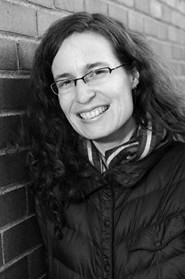
Introducing Fiona Otway
When film and media arts graduate student Fiona Otway first picked up a camera, she was creating anti-smoking public service announcements for her health class in junior high school. Although she still uses film as a medium for raising awareness, Otway’s audience has grown quite a bit since her PSA days. She has worked as editor for a number of successful documentaries, two of which were nominated for an Academy Award, and was the first person to receive Sundance Film Festival’s “Best Documentary Editing” award. Her most recent project, “Hell and Back Again,” follows a 25-year-old Marine from dangerous battles in Afghanistan to his rocky readjustment to life back home in North Carolina and won Sundance’s “Grand Jury Prize” and “Best Cinematography” awards.
Ten years after completing her undergraduate studies, Otway decided to return to school, and is in her second year of obtaining her master’s. Otway took a break from editing her latest documentary focused on international adoptions, to chat on the phone with The Temple News about the power of documentaries, the editing process and following passions.
The Temple News: You seem to be doing very well as a filmmaker. What made you decide to go back to school?
Fiona Otway: Temple offered me a really sweet fellowship and so for me it was an opportunity to take time out of the world of freelancing, where you’re constantly hustling, and spend that time focusing on my own work and developing my craft and sort of investing in myself as an artist. So it’s the chance for me to take risks and try new things and beef up my skills and really just go deeper into filmmaking.
TTN: You’ve been involved in film production from many different angles from director to cinematographer to producer. What do you enjoy about editing that those other roles can’t provide?
FO: Editing is sort of this magical process where it happens at the end and I get handed a pile of footage. And because I’m working on documentaries there’s not usually a script, so I have to find the story in the editing process. So it’s this really intensely creative process of writing, only you do it with images and sound and music and time and rhythm. It’s almost an indescribable feeling when you take a bunch of raw footage and assemble it together and you see a story start to hang together. It’s really magical and it can be very tedious but every time things start to really gel, I fall in love with the process over and over again.
TTN: Why do you think you’ve gravitated to documentaries as opposed to fictional films?
FO: Documentary is so much fun. Part of the reason that I was drawn to filmmaking in the first place is because I was interested in working on social issues through filmmaking and documentary lends itself to that in a very obvious way. But also there’s just something special about working from footage that is gathered from the real world that documents people’s actual lives. Some of the greatest documentaries are so wonderful that you couldn’t even imagine how to try and fictionalize something like that. Reality sometimes is so much more precious in what it offers you than what you can imagine and fictionalize.
I think it all comes down to the fact that I love documentaries. It’s a way for me to learn about the world, and learn about myself and hopefully create stories that help others feel connected to the larger world and understand how we can all be connected to each other and help each other.
TTN: Two of your films have been nominated for an Academy Award. What was it like attending the awards?
FO: It’s a really strange experience to be there because as a documentary filmmaker at the Academy Awards, you are a very small fish in a very big pond, and so you end up meeting the other documentary filmmakers who are there and you kind of bond with them through the experience. And then you’re surrounded by all these celebrities in a very surreal way.
TTN: What advice do you have for aspiring filmmakers?
FO: I think filmmaking is so hard and you really have to be incredibly persistent and I think you have to find work that you feel passionate about and do that work whether it’s doing your own work or if it’s shooting for somebody else or editing for somebody else I think the more opportunity that you have to work on projects that you feel passionate about the more that you’ll be challenged in the process and the more your skills will improve along the way and then people will start to recognize your passion and what you’re doing and further opportunities will present themselves.
Marisa Steinberg can be reached at marisa.steinberg@temple.edu.



Be the first to comment